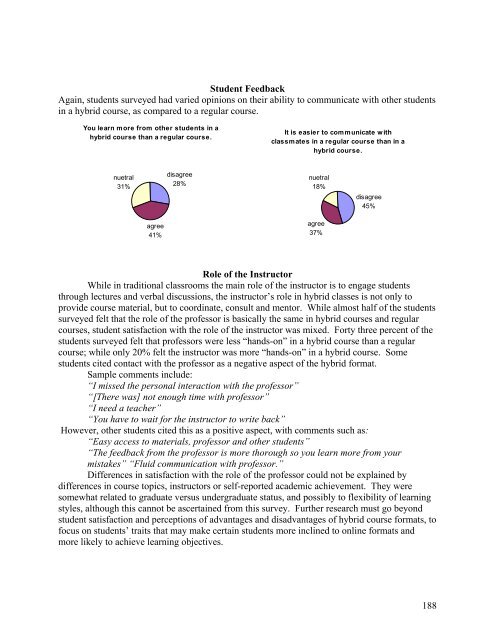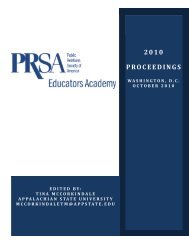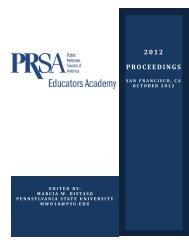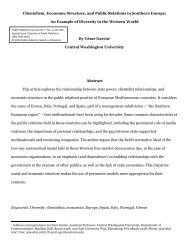2008 PROCEEDINGS - Public Relations Society of America
2008 PROCEEDINGS - Public Relations Society of America
2008 PROCEEDINGS - Public Relations Society of America
Create successful ePaper yourself
Turn your PDF publications into a flip-book with our unique Google optimized e-Paper software.
Student Feedback<br />
Again, students surveyed had varied opinions on their ability to communicate with other students<br />
in a hybrid course, as compared to a regular course.<br />
You learn more from other students in a<br />
hybrid course than a regular course.<br />
It is easier to communicate w ith<br />
classmates in a regular course than in a<br />
hybrid course.<br />
nuetral<br />
31%<br />
disagree<br />
28%<br />
nuetral<br />
18%<br />
disagree<br />
45%<br />
agree<br />
41%<br />
agree<br />
37%<br />
Role <strong>of</strong> the Instructor<br />
While in traditional classrooms the main role <strong>of</strong> the instructor is to engage students<br />
through lectures and verbal discussions, the instructor’s role in hybrid classes is not only to<br />
provide course material, but to coordinate, consult and mentor. While almost half <strong>of</strong> the students<br />
surveyed felt that the role <strong>of</strong> the pr<strong>of</strong>essor is basically the same in hybrid courses and regular<br />
courses, student satisfaction with the role <strong>of</strong> the instructor was mixed. Forty three percent <strong>of</strong> the<br />
students surveyed felt that pr<strong>of</strong>essors were less “hands-on” in a hybrid course than a regular<br />
course; while only 20% felt the instructor was more “hands-on” in a hybrid course. Some<br />
students cited contact with the pr<strong>of</strong>essor as a negative aspect <strong>of</strong> the hybrid format.<br />
Sample comments include:<br />
“I missed the personal interaction with the pr<strong>of</strong>essor”<br />
“[There was] not enough time with pr<strong>of</strong>essor”<br />
“I need a teacher”<br />
“You have to wait for the instructor to write back”<br />
However, other students cited this as a positive aspect, with comments such as:<br />
“Easy access to materials, pr<strong>of</strong>essor and other students”<br />
“The feedback from the pr<strong>of</strong>essor is more thorough so you learn more from your<br />
mistakes” “Fluid communication with pr<strong>of</strong>essor.”<br />
Differences in satisfaction with the role <strong>of</strong> the pr<strong>of</strong>essor could not be explained by<br />
differences in course topics, instructors or self-reported academic achievement. They were<br />
somewhat related to graduate versus undergraduate status, and possibly to flexibility <strong>of</strong> learning<br />
styles, although this cannot be ascertained from this survey. Further research must go beyond<br />
student satisfaction and perceptions <strong>of</strong> advantages and disadvantages <strong>of</strong> hybrid course formats, to<br />
focus on students’ traits that may make certain students more inclined to online formats and<br />
more likely to achieve learning objectives.<br />
188
















